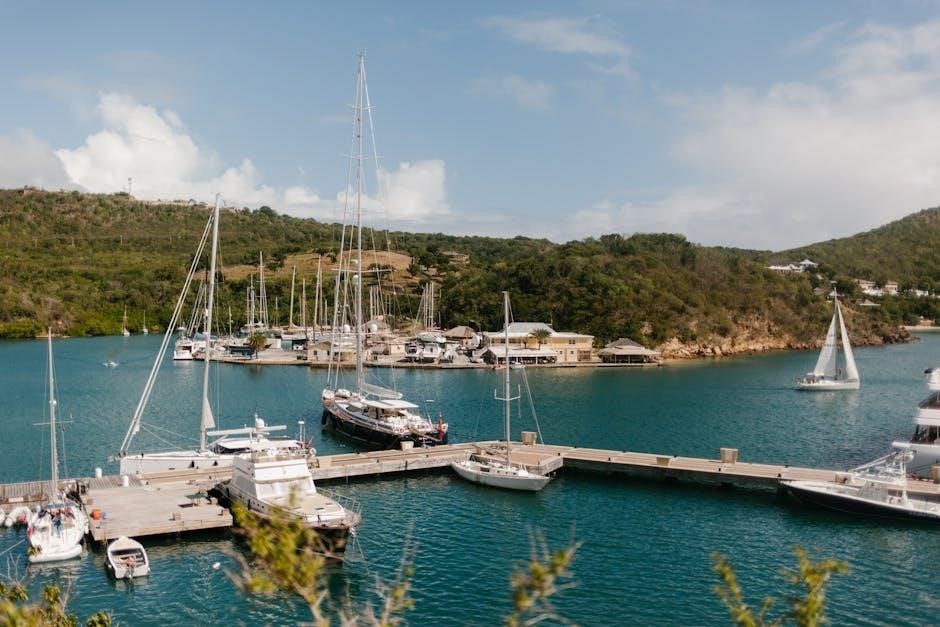Maritime English is essential for foreign officers, serving as the lingua franca in the shipping industry. It ensures safe and efficient communication, complying with STCW requirements.

1.1 Importance of Maritime English in the Shipping Industry
Maritime English is vital for ensuring clear communication among multinational crews, enhancing safety, and streamlining ship operations. It bridges language barriers, fostering teamwork and reducing errors; Proficiency in Maritime English is mandated by international conventions like STCW 78/95, making it a critical skill for foreign officers. Effective communication in English ensures compliance with safety protocols, standard marine phrases, and emergency procedures, ultimately safeguarding lives and cargo. Its importance extends to technical operations, navigation, and adherence to global maritime standards.
1.2 Brief Overview of the STCW Code Requirements
The STCW Code mandates that all seafarers, including foreign officers, demonstrate proficiency in Maritime English. This ensures effective communication during emergencies and routine operations. The code specifies that training must cover grammar, vocabulary, and standard marine phrases, aligning with IMO Model Course 3.17. Compliance with these requirements is essential for certification and safe navigation, emphasizing the need for structured curricula in maritime education. Regular updates to the STCW Code reflect industry changes, ensuring seafarers are prepared for modern maritime challenges.

Regulatory Requirements and Standards
Maritime English must comply with STCW Code requirements, ensuring officers meet standardized language proficiency levels. The IMO Model Course 3.17 provides the framework for effective communication training.
2.1 STCW Code A-II/1 and A-III/1: Mandatory English Language Skills
The STCW Code A-II/1 and A-III/1 mandate English proficiency for deck and engineering officers; These sections ensure officers can use English publications, perform duties, and communicate effectively. The requirements focus on enabling safe and efficient operations, particularly in emergency situations. Compliance with these standards is critical for meeting international maritime safety expectations and facilitating clear communication among multilingual crews. Proficiency in Maritime English is thus a cornerstone of professional competence for foreign officers.
2.2 IMO Model Course 3.17: Maritime English Curriculum
The IMO Model Course 3.17 outlines a structured curriculum for Maritime English training. It covers specialized vocabulary, grammar, and standard marine communication phrases. The course emphasizes practical skills, such as emergency response and ship operations. Role-plays and simulations are integral, mirroring real-life scenarios. Regular updates ensure relevance, addressing industry changes. This curriculum is essential for foreign officers, aligning with STCW requirements and fostering effective communication in multilingual environments. It ensures officers meet the linguistic demands of the maritime industry, enhancing safety and operational efficiency.
Key Components of Maritime English
Maritime English includes specialized vocabulary, grammar, and Standard Marine Communication Phrases (SMCP). It is part of English for Specific Purposes, focusing on functional and technical aspects.
3.1 Specialized Vocabulary and Grammar
Maritime English incorporates a distinct vocabulary and grammar system tailored for marine activities. It is part of English for Specific Purposes (ESP), focusing on functional and technical communication. The British linguist Firth J.R. described it as a reduced linguistic system, emphasizing clarity and precision. This specialized language reduces grammatical and lexical complexity, ensuring efficient communication in maritime operations. It is integrated with Standard Marine Communication Phrases (SMCP) to maintain safety and efficiency at sea. Resources like handbooks and courses are available to help foreign officers master this system.
3.2 Standard Marine Communication Phrases (SMCP)
Standard Marine Communication Phrases (SMCP) are predefined expressions used to ensure clarity and safety in maritime operations. They focus on functional communication, covering routine and emergency situations. SMCP includes around 3,000 essential phrases, enabling efficient and unambiguous exchanges between crew members. These phrases are crucial for bridge team communication, navigation, and emergency response. Compliance with SMCP is mandatory under international conventions like STCW, ensuring that all officers, regardless of native language, can communicate effectively. Regular training and practice are recommended to master these standardized phrases.

Training and Resources for Maritime English
Recommended courses and workshops focus on practical communication skills, while downloadable PDF materials provide essential vocabulary, phrases, and exercises aligned with IMO standards.
4.1 Recommended Courses and Workshops
Recommended courses and workshops for Maritime English focus on practical communication skills. A 5-day training program covers grammar, vocabulary, and standard phrases, with simulations for real-life tasks like docking. These programs align with IMO Model Course 3.17, ensuring proficiency in maritime terminology and emergency procedures. Workshops emphasize role-plays and exercises based on actual scenarios, helping officers communicate effectively. Such structured training ensures compliance with STCW requirements and enhances teamwork and safety at sea.
4.2 Downloadable PDF Materials and Handbooks
Downloadable PDF materials and handbooks are invaluable resources for foreign officers aiming to enhance their Maritime English skills. These include comprehensive guides like the Maritime English Handbook for Deck Officers, which aligns with STCW and IMO Model Course 3.17 standards. The handbooks cover specialized vocabulary, standard marine communication phrases, and practical exercises. Regularly updated, these PDFs provide current industry information, ensuring officers can perform their duties effectively. They serve as essential tools for improving communication, safety, and teamwork in maritime operations.

Challenges Faced by Foreign Officers
Foreign officers face challenges like language barriers, communication difficulties, and understanding cultural nuances, all critical in maritime operations requiring precise English proficiency.
5.1 Language Barriers and Communication Difficulties
Language barriers and communication difficulties are significant challenges for foreign officers, often stemming from limited English proficiency. These issues can hinder effective teamwork, safety protocols, and emergency response. Non-native speakers may struggle with standard marine communication phrases (SMCP) and technical terminology, leading to misunderstandings. Additionally, cultural differences can complicate interactions, further exacerbating communication challenges. Addressing these barriers is crucial to ensure seamless operations and compliance with international maritime standards, as outlined in the STCW Code and IMO Model Course 3.17. Regular training and updated resources are essential to bridge these gaps.
5.2 Cultural and Technical Aspects of Maritime English
Cultural and technical aspects of Maritime English present unique challenges for foreign officers. Cultural nuances may affect understanding, while technical terminology requires precise knowledge. The specialized vocabulary and grammar, part of English for Specific Purposes (ESP), demand focused learning. Standard Marine Communication Phrases (SMCP) are critical for safety but can be difficult for non-native speakers. Simulations and role-plays, as recommended in IMO Model Course 3.17, help bridge these gaps, ensuring officers can communicate effectively in diverse cultural and technical maritime environments. Comprehensive training is essential to master these aspects.
Role of Technology in Learning Maritime English
Technology enhances Maritime English learning through e-learning platforms, simulations, and interactive tools, providing practical exposure and improving communication skills for foreign officers.
6.1 E-Learning Platforms and Simulations
E-learning platforms offer flexible Maritime English training, featuring interactive modules and simulations. These tools mimic real-life scenarios, enabling officers to practice standard communication phrases and emergency responses effectively. Simulations focus on tasks like docking and navigation, enhancing practical skills. Regular updates ensure content aligns with industry changes, providing relevant and current training materials. This approach helps foreign officers improve proficiency in a structured and engaging manner, bridging language gaps and ensuring safe operations at sea.
6.2 Interactive Tools for Effective Communication Training
Interactive tools, such as role-plays and simulations, enhance Maritime English training by immersing officers in real-life scenarios. These tools focus on problem-solving, teamwork, and clear communication, aligning with STCW standards. Officers practice standard marine phrases, navigate emergencies, and engage in exercises like labeling ship parts. Such hands-on approaches improve comprehension and application of Maritime English, ensuring officers can communicate effectively in multicultural crews and high-pressure situations. These tools are integral to modern training, fostering practical proficiency and safety at sea.
Maritime English remains vital for foreign officers, ensuring safety and efficiency. Continuous updates to training resources and industry standards will enhance proficiency, adapting to evolving maritime demands.
7.1 Continuous Improvement in Maritime English Training
Continuous improvement in Maritime English training is crucial for enhancing safety and efficiency at sea. Modern technologies and interactive tools now play a significant role in refining language skills. Regular updates to training materials ensure alignment with industry changes. Practical exercises, simulations, and standardized communication protocols are being integrated to better prepare foreign officers. These advancements aim to bridge language gaps and foster seamless teamwork. By prioritizing ongoing development, Maritime English training continues to evolve, ensuring officers meet global standards and perform their duties effectively.
7.2 Adapting to Industry Changes and Updates
The maritime industry’s evolving standards necessitate continuous adaptation in English training. Updates to the IMO Model Course 3.17 and other regulations require foreign officers to stay informed. Regularly updated PDF materials and curricula ensure compliance with the latest requirements. These resources incorporate new terminology, communication protocols, and operational procedures. By aligning training with industry advancements, officers can maintain proficiency and contribute effectively to safe and efficient global maritime operations.